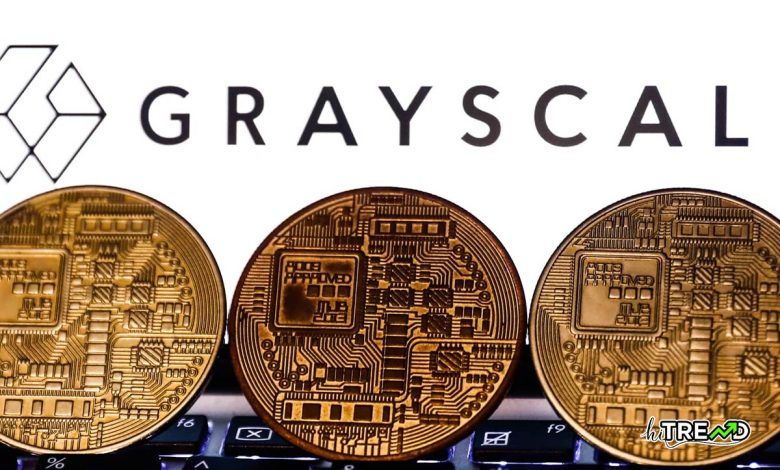Grayscale’s $9 billion head start in ethereum is at risk as big investors launch ETFs

For crypto firm Grayscale, it’s deja vu in the ETF market.Grayscale’s $9 billion head start in ethereum is at risk as big investors launch ETFs
On Tuesday, the first spot ether
exchange-traded funds hit the U.S. The ETFs will invest directly in ether, the cryptocurrency used in the Ethereum network, allowing investors to buy the cryptocurrency the way they buy stock and bond index funds.
You can read more Crypto articles
Grayscale, founded in 2013, has spent years building a trust that holds over $9 billion worth of ether. That trust has now been converted to an ETF, and is one of two that the firm will offer. Grayscale is a unit of Barry Silbert’s crypto conglomerate Digital Currency Group.
With the SEC clearing the path for ETFs, Grayscale will have a boatload of rivals, and investors can go hunting for the lowest fees. Large financial firms, including Fidelity Investments, Franklin Templeton, BlackRock
and Invesco, are already on the market with their own spot ether ETFs.
The same thing happened in January, when bitcoin
ETFs were approved, a move that led many investors to flee Grayscale’s products for cheaper alternatives.
In their first day of trading on Tuesday, spot ether ETFs collectively saw over $1 billion in volume, with JPMorgan
analysts estimating net sales of $104 million.
While money poured into the new offerings, the Grayscale Ethereum Trust (ETHE) saw redemptions of $485 million. JPMorgan attributed the outflow to investors likely switching into cheaper alternatives, or using the ETF conversion to capitalize on increased liquidity versus the previous trust structure.
In the bitcoin ETF market, Grayscale has been struggling to handle the flood of competition.
Grayscale began trading shares in its bitcoin trust (GBTC) in 2015 as a closed-end fund in what Morningstar’s Bryan Armour previously described as “something of a monopoly.” In the first seven months of trading after converting from a trust to an ETF, the company saw outflows of close to $18.7 billion, according to JPMorgan, largely because its management fee of 1.5% is significantly higher than that of competitors.Grayscale’s $9 billion head start in ethereum is at risk as big investors launch ETFs
In May, BlackRock overtook Grayscale in assets with its iShares bitcoin ETF. Blackrock’s ETF has a fee, excluding the waiver, of 0.25%.
With ethereum, Grayscale is offering ETHE, which is charging a fee of 2.5% — a number that’s 10 times more than the second-highest fee among the newly listed funds. Grayscale has also spun off 10% of its assets to form a mini-ether ETF designed for retail clients. The Grayscale Ethereum Mini Trust (ETH) is meant to be a budget product with a fee of 0.15%, the lowest of the new ETFs.
The others in the category range from 0.19% to 0.25%. Most issuers are initially waiving fees, with some doing so for up to a year.
Grayscale said ETHE saw trading volume of about $500 million on Wednesday, the second day of trading, while the total value traded for ETH was just over $100 million, up about 54% from Tuesday’s level.
Grayscale’s David LaValle, the firm’s global head of ETFs, told CNBC in a statement that ETHE “has been and continues to be a trusted, efficient tool for investors interested in gaining exposure to Ethereum in the form of a regulated U.S. security.”
Since becoming publicly quoted in June 2019, its ethereum trust has had an annual return of 61%, LaValle said, adding the mini ether ETF “came to market with the lowest top line expense ratio.” Between its two products, Grayscale has the highest and lowest management fees.
LaValle said the “bigger picture” is that the $1 billion of volume on day one “is a testament to the many industry participants showing up to play their part in supporting investors and the Ethereum ETP ecosystem.”
Rough year for Grayscale
Figuring out how to navigate the new world of ETFs will be the responsibility of former Goldman Sachs
executive Peter Mintzberg, who was appointed Grayscale CEO in May, just a few days before BlackRock overtook Grayscale’s bitcoin ETF in assets.
Mintzberg replaced Michael Sonnenshein, who led Grayscale Investments for a decade. It was a gig that took him across the globe, from the World Economic Forum in Davos to virtually every flagship crypto conference.
During Sonnenshein’s tenure, the company ran the world’s largest bitcoin
fund, with more than $43 billion in assets under management at its peak. Grayscale dominated the business of running a crypto trust, giving it substantial pricing power. It was considered by many to be the crown jewel in Silbert’s crypto empire.
In a landmark moment for the crypto sector, Sonnenshein led Grayscale to a win in its legal battle with the Securities and Exchange Commission over its application to convert GBTC into a spot bitcoin ETF. The victory paved the way for the broad approval of spot bitcoin ETFs and helped cement crypto as a legitimate asset class.
While Sonneshein made Grayscale’s legal path clearer, the firm’s competitive advantage is murkier than ever. The press release announcing his resignation in May said he was leaving to “pursue other interests.” His LinkedIn profile identifies him as former CEO of Grayscale and says he’s an advisor at a couple companies. Sonnenshein didn’t respond to a request for comment.Grayscale’s $9 billion head start in ethereum is at risk as big investors launch ETFs
Silbert resigned as chairman of Grayscale in December and was replaced by Mark Shifke, DCG’s finance chief. Mintzberg officially takes over as CEO in mid-August. Grayscale finance chief Edward McGee is running the firm in the interim.
Beyond Grayscale, DCG was battered in the fallout of the 2022 crypto meltdown, with lending business Genesis eventually filing for bankruptcy after being charged by the SEC with selling unregistered securities. In May, New York Attorney General Letitia James settled with Genesis for $2 billion to repay defrauded investors.
While Grayscale has its share of challenges, the firm is benefiting from a rebound in the crypto market over the past 18 months. The price of bitcoin has quadrupled since the end of 2022, and GBTC has done even better, jumping more than sevenfold. Ethereum has almost tripled over that stretch.
DCG’s revenue increased 51% in the first quarter from a year earlier, and the company says it repaid all its debt, with its only remaining third-party liability to Genesis.
Grayscale is trying to ride the renewed enthusiasm, writing in a press release on Tuesday that “client demand is growing alongside the maturation of the crypto asset class.”
Follow HiTrend on X





